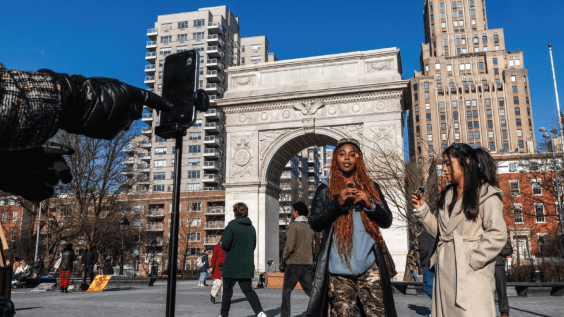
1 in 5 Americans now regularly get news on TikTok, up sharply from 2020
Among adults under 30, 43% say they regularly get news from TikTok, up from 9% in 2020.
Numbers, Facts and Trends Shaping Your World
Short-form data and analysis from Pew Research Center writers and social scientists. To view all our reports and publications, visit our main Publications page.
Among adults under 30, 43% say they regularly get news from TikTok, up from 9% in 2020.
Fresh data delivered Saturday mornings
Just over half of Facebook users have adjusted privacy settings in the past year. Around four-in-ten have taken a break from checking for several weeks or more.
Large majorities in eight Western European countries trust the military, ranging from 84% in France to 66% in Spain. Similarly, eight-in-ten Americans have confidence in the military.
Thousands of space launches have spawned a massive orbital junkyard. Many Americans are doubtful private companies will keep space clean of debris.
Ahead of the Senate’s deliberations over Kavanaugh, here’s a look at where the public stands on some of the major legal, political and social issues that could come before the Supreme Court in the years ahead.
Most Americans like labor unions, at least in the abstract. A majority (55%) holds a favorable view of unions, versus 33% who hold an unfavorable view, according to a Pew Research Center survey from earlier this year. Despite those fairly benign views, unionization rates in the United States have dwindled in recent decades. As of 2017, just 10.7% of all wage and salary workers were union members, matching the record low set in 2016, according to the U.S. Bureau of Labor Statistics.
This new analysis creates a typology that cuts across denominations, sorting Americans into seven groups, or “clusters,” based on their religious practices and values, their views about religion in general, and the sources of meaning and fulfillment in their lives. Rich Morin, a senior editor at the Center, explains how the study was put together, and discusses the role of cluster analysis in creating the typology.
Most American adults identify with a religion, describing themselves as Protestants, Catholics or Jews, to name just a few examples. But a new Pew Research Center analysis looks at beliefs and behaviors that cut across many religious identities, producing a new and revealing classification, or typology, of religion in America that sorts U.S. adults into seven cohesive groups.
Views of Mexico are mixed: While 39% say they feel “warmly” toward Mexico, 34% feel “coldly,” and 26% are neutral, according to a new Pew Research Center survey. The public has much warmer feelings toward Canada. Two-thirds (67%) say they feel warmly toward Canada, with 52% giving it a very warm rating (76 or higher on the scale). Just 12% feel coldly toward Canada.
Nearly eight-in-ten Americans say that when it comes to important issues facing the country, most Republican and Democratic voters not only disagree over plans and policies, but also cannot agree on basic facts. Ironically, Republicans and Democrats do agree that partisan disagreements extend to the basic facts of issues, according to a new Pew Research Center survey
More than 22.4 million people applied in 2017 to a U.S. visa program that provides 50,000 green cards each year through a lottery system. The number of applicants nearly matched the record 23 million applicants received in 2016 and came as the Trump administration and some members of Congress have sought to eliminate the program – the only one of its kind globally.
Notifications


